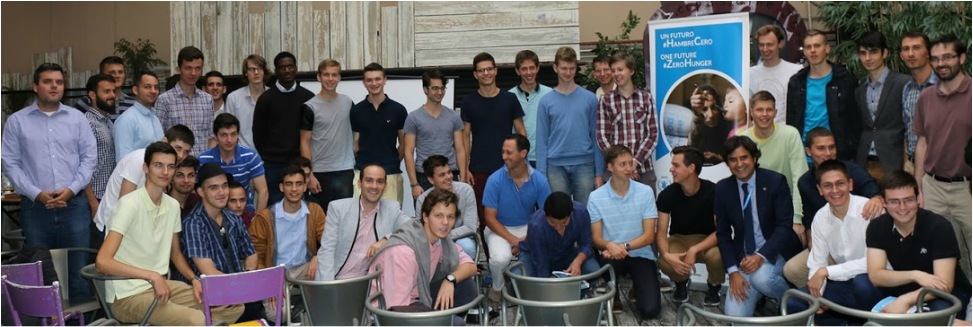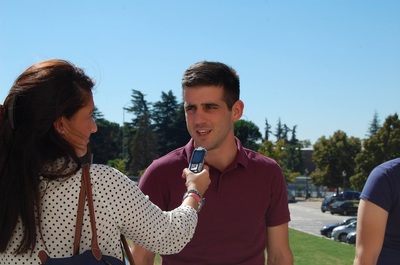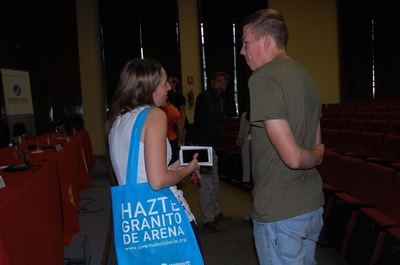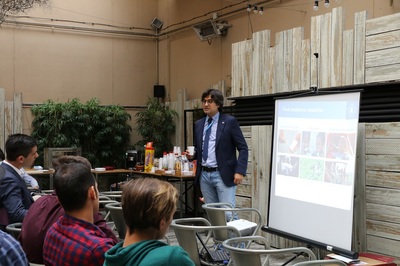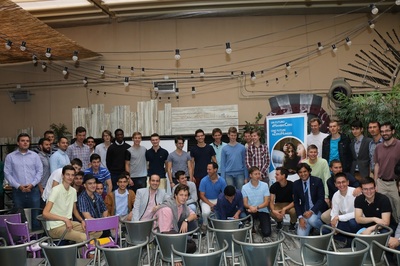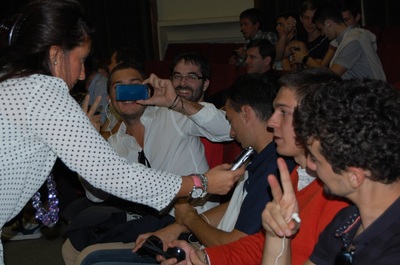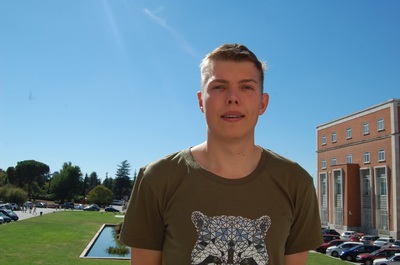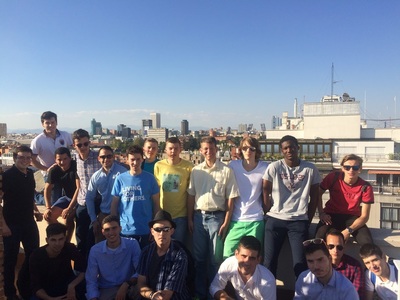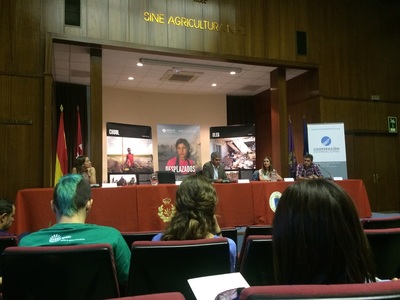
At the end of September, I had the good fortune to participate in a project called “Building Inclusive Societies”. The event was organized by Cooperación Internacional ONG with the financial assistance of the Erasmus+ Programme of the European Commission. Together with five youngsters from Latvia we travelled to Madrid where we met about 45 youngsters from eight other European countries. The experience was unforgettable, and inspired us to do more here in Latvia to help others.
Before our trip to Madrid, our group prepared a presentation about Latvia, highlighting its natural beauty, favourite sports, and architecture. We discussed the particular challenges faced by people here in Latvia, in particular the interconnected problems of poverty, alcohol abuse, and family instability. A consequence of the difficult situation in Latvia is economic migration to other countries, which has caused our population to shrink dramatically in the last years. At the same time, we identified a number of strengths, such as the resilience of the population in the face of difficulties, and a pragmatic attitude towards sharing resources and helping those in need. One manifestation is the widespread custom of the talka, which involves people getting together to help out. It could be to clean up the neighbour’s yard or the city park or something completely different.
Madrid was a challenge for us. The city of Madrid has twice as many inhabitants as our country. At times the spanish way of doing things seemed chaotic to us, but we learned to appreciate another side of life. We learned that life is not all about efficiency and results, and that sometimes it is worthwhile to enjoy life’s little surprises. These lessons are hard to put into words, but they may be among the most important take-aways from our trip.
We heard some very interesting and though-provoking lectures. The head of the Madrid office of the United Nations World Food Programme, Antonio Salort, talked to us about the problem of hunger in the world. He helped us appreciate what real hunger meant, and how important it is to dignity. Alfredo Panadero told us about the sufferings of Christians in Iraq as a result of the conquests of ISIS, and how he is telling their story through a documentary. Josemaria Torregrosa showed us how International Youth Cooperation (IYC) is helping ordinary young people are make a difference in the lives of others by volunteering. Their lemma is “Living for Others”. Another very moving event was a round-table discussion about the journeys of refugees from different war zones based on a report of the New York Times. Professor Virginia Linares discussed the role of branding and social media in promoting a cause. We were very fortunate to be able to participate in a case study at IESE with Professor Roberto Garcia-Castro to help us analyse decisions and strategy, which are youthful skills when organising social projects.
Of course, we had also lots of informal time to spend with the youngsters from other countries and exchange ideas about what we might do to build more inclusive societies. We learned about the difficulties encountered in different countries and ways to overcome them. It was encouraging to know how much is being done, but the lemma of IYC, “living for others”, inspired us to dream of reaching further. Now that we are back in Latvia, the time has come to put those dreams into action.
Before our trip to Madrid, our group prepared a presentation about Latvia, highlighting its natural beauty, favourite sports, and architecture. We discussed the particular challenges faced by people here in Latvia, in particular the interconnected problems of poverty, alcohol abuse, and family instability. A consequence of the difficult situation in Latvia is economic migration to other countries, which has caused our population to shrink dramatically in the last years. At the same time, we identified a number of strengths, such as the resilience of the population in the face of difficulties, and a pragmatic attitude towards sharing resources and helping those in need. One manifestation is the widespread custom of the talka, which involves people getting together to help out. It could be to clean up the neighbour’s yard or the city park or something completely different.
Madrid was a challenge for us. The city of Madrid has twice as many inhabitants as our country. At times the spanish way of doing things seemed chaotic to us, but we learned to appreciate another side of life. We learned that life is not all about efficiency and results, and that sometimes it is worthwhile to enjoy life’s little surprises. These lessons are hard to put into words, but they may be among the most important take-aways from our trip.
We heard some very interesting and though-provoking lectures. The head of the Madrid office of the United Nations World Food Programme, Antonio Salort, talked to us about the problem of hunger in the world. He helped us appreciate what real hunger meant, and how important it is to dignity. Alfredo Panadero told us about the sufferings of Christians in Iraq as a result of the conquests of ISIS, and how he is telling their story through a documentary. Josemaria Torregrosa showed us how International Youth Cooperation (IYC) is helping ordinary young people are make a difference in the lives of others by volunteering. Their lemma is “Living for Others”. Another very moving event was a round-table discussion about the journeys of refugees from different war zones based on a report of the New York Times. Professor Virginia Linares discussed the role of branding and social media in promoting a cause. We were very fortunate to be able to participate in a case study at IESE with Professor Roberto Garcia-Castro to help us analyse decisions and strategy, which are youthful skills when organising social projects.
Of course, we had also lots of informal time to spend with the youngsters from other countries and exchange ideas about what we might do to build more inclusive societies. We learned about the difficulties encountered in different countries and ways to overcome them. It was encouraging to know how much is being done, but the lemma of IYC, “living for others”, inspired us to dream of reaching further. Now that we are back in Latvia, the time has come to put those dreams into action.
Project in Brief
Project Name: Building Inclusive Societies
Host Institution: Cooperación Internacional ONG
Project Sponsor: European Commission (through ERASMUS+ Programme)
Main event: September 22—28 in Madrid, Spain
Number of participants: 49
Age of participants: 17—25
Number of Countries involved: 9 (Romania, Croatia, Slovak Republic, Czech Republic, Hungary, Latvia, Germany, Finland, and Spain)
Host Institution: Cooperación Internacional ONG
Project Sponsor: European Commission (through ERASMUS+ Programme)
Main event: September 22—28 in Madrid, Spain
Number of participants: 49
Age of participants: 17—25
Number of Countries involved: 9 (Romania, Croatia, Slovak Republic, Czech Republic, Hungary, Latvia, Germany, Finland, and Spain)
Proudly powered by Weebly

